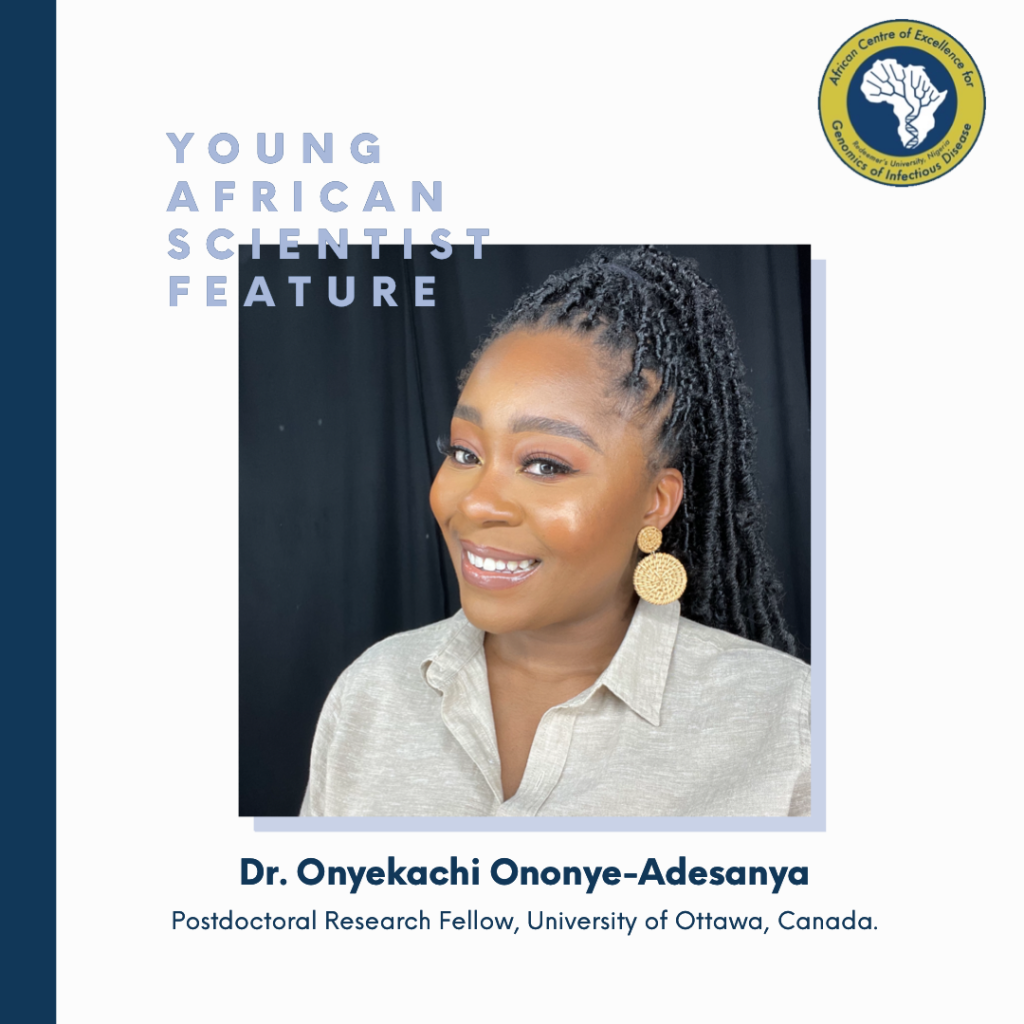With our series “Young African Scientists”, we’ll be putting a spotlight on African scientists around the globe doing amazing work and research. Today’s spotlight is shining on Dr. Onyekachi Ononye-Adesanya, a Postdoctoral Research Fellow at the Faculty of Medicine, University of Ottawa, Canada.

Can you share a bit about yourself, your educational background, and what you do?
My name is Dr. Onyekachi Ononye-Adesanya and I’m Anambra state in Nigeria. I spent my childhood and early adult years in Lagos, Nigeria. I did a short stint at the University of Lagos for about 1.5 years before going to Maryville College, Tennessee, USA where I started over and got my undergraduate degree (Bachelor of Science) in Biology with a minor in Chemistry. Finally, I attended Indiana University – Purdue University Indianapolis (IUPUI) where I got my doctorate in Biology with a focus in biochemistry and molecular biology. I currently work as a postdoctoral research fellow at the Faculty of Medicine, University of Ottawa, Canada.
What was your career journey like?
Honestly, my career path has been filled with faith, failure, and a ton of networking. From secondary school, I knew I was interested in science, but I didn’t want to go the medicine route which was always touted as the prime career. After my first year in the US, I started to seek out opportunities that would help me tease out what exactly I liked about science. This wasn’t necessarily the easiest thing to do as an international student given the policies, but I was determined.
The summer after my first year, I went back to Nigeria for a month and for about 3 weeks, volunteered at The Sickle Cell Foundation of Nigeria. I didn’t do bench work that year, but most of my time was spent learning about the foundation, meeting potential donors, and working on fund raising prospects. At the time, I would post updates on Facebook and some of my college professors followed along. So, when a grant was awarded to one of those professors, they hired me to be a lab tech for one semester. It was at this point that I knew being in a lab appealed to me.
After the grant was over, I asked to be kept on without pay. I did this job for different professors till I graduated. While I never got paid in cash, I was given the opportunity to meet and create an amazing network of scientists, receive stellar recommendations because these professors knew me personally etc. I should mention that any summer I went to Nigeria, I volunteered at the same foundation doing more bench work.
After graduation however, I applied to several graduate schools, but didn’t get in. However, with the network and relationships I had developed, a job was created for me at my undergrad institution where I got to teach lab courses as well as handle the department’s lab prep for a year. The next year, I got into graduate school at IUPUI and five years later, I graduated with my doctorate. I got my job soon after from an initial interaction on twitter that ballooned into a series of interviews.
What does your research work focus on?
My current work in the Downey laboratory is focused on understanding the impact of a novel post-translational modification (polyphosphorylation) on a myriad of cellular processes including DNA damage responses using both bacteria and yeast model systems. Most cells utilize inorganic phosphate molecules for their function, but these molecules need to be stored away until they are needed. So, these phosphate residues are joined together by high energy bonds into varying lengths and the resulting chain is called polyphosphate.
While the knowledge of polyphosphate biology has been around for many decades, very little is known about how these chains add themselves to various proteins, modifying them and thereby altering various aspects of the protein’s biochemistry. My work aims to identify some of the proteins that can be modified and outline how different biological pathways are impacted as a result.
What do you think about diversity in stem, especially as an African woman working outside of the continent?
One thing is for certain, diversity is essential. I mean this in all spheres of life, but most especially in STEM. Diversity allows for the best possible outcome or the most wholistic outlook to science as it affords a variety of ways to approach scientific enquiry and even methodology. The result is a well-rounded story that is formed because our individual experiences and expressions allows us to address things from different angles.
Additionally, as an African woman in this space, I cannot stress enough the importance of representation. Part of my inspiration to stay in academia is the fact that other women, African women can see that this is possible. I’ve been privileged to teach students over the past 6 years, and I recognize the role simply being a black woman or an African play in building the confidence of students. Throughout my graduate school experience, there was only one tenured black female professor who eventually left seeking a better academic work culture. I was very fortunate to work under my graduate school mentor who was a woman of color. She knew some of the personal and systemic issues that academia presents and was able to guide me through some hoops as best as she could. With that said, DIVERSITY IS IMPORTANT. We need more Africans in this space.
What advice will you give to young Africans that are looking to get into a career in STEM?
The advice I’ll give young Africans looking towards a stem career is two-fold:
1) Recognize that the journey you are going to embark on is challenging, but you can do it through hard work and building strong support systems.
2) Your support system truly needs to be built so don’t be afraid to network. Remember that while cash is a great incentive, so is a quality network. It works wonders!